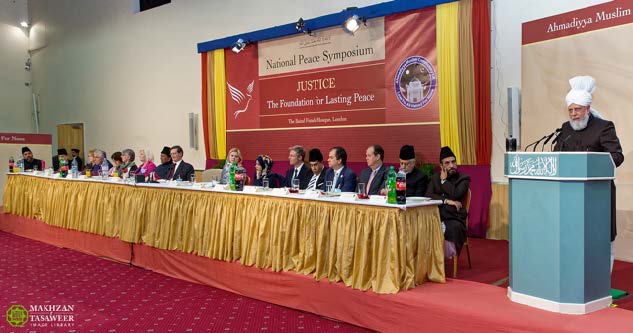Did Prophet Muhammad (sa) Kill People for Leaving Islam?

By Missionary Mansur Ahmed Chattha
Introduction
One of the myths perpetuated about Islam is that Prophet Muhammad (sa) forced people to accept Islam and a Muslim who denounced his faith was punished to death. This allegation is further strengthened by some simple-minded Muslim ulema [scholars] who hold such baseless convictions.
As we will prove in this article, this menacing tenet is based neither on the Quran nor on the practice of the Prophet of Islam.
“Swords can win territories but not hearts, forces can bend heads but not minds.”
Hazrat Mirza Tahir Ahmad, Khalifatul Masih IV (rh)
Holy Quran as a Champion for Religious Freedom
Islam does not permit the use of force as an instrument for the spread of its message. The Holy Quran declares:
“There should be no compulsion in religion. Surely, right has become distinct from wrong.”
The Holy Quran, 2:257
Moreover, God Almighty outlined the role of the Holy Prophet Muhammad (sa) as a reformer and an admonisher, and nothing more. Thus God Almighty says:
“Admonish, therefore, for you are but an admonisher; you have no authority to compel them.”
The Holy Quran, 88:22-23
“But if they turn away, We have not sent thee as a guardian over them. Thy duty is only to convey the Message. Leave it to God to make the Message effective.”
The Holy Quran, 42:49
The Quran on Treatment of Apostates
How should those who leave Islam be treated? The Quran states:
“They have made their oaths a shield; thus they turn men away from the way of Allah. Evil surely is that which they have been doing. That is because they first believed, then disbelieved. So a seal was set upon their hearts and consequently they understand not.”
The Holy Quran, 63:3-4
This verse deals with the subject of apostasy and there is no mention or even an indication of death as its punishment. In this verse, God Himself is bearing witness that some people have turned apostate. The next verses tell us that the Holy Prophet (sa) and his Companions (ra) had specific knowledge of who they were. After having such strong and certain evidence, such that God had testified to their apostasy, the Quran goes on to exhort the Holy Prophet (sa) to call such individuals to repentance and reformation:
“Come [and repent so] that the Messenger of Allah may ask forgiveness for you,”
The Holy Quran, 63:6
Despite this magnanimous attitude, the apostates followed the following course:
“…they turn their heads aside, and you see them keeping back while they are full of pride.”
The Holy Quran, 63:6
In the light of these verses of the Holy Quran, it is evident that God did not command the killing of apostates even when God Almighty, Who knows the secrets of the hearts, Himself was a witness to their disbelief, and the Holy Prophet (sa) and his Companions (ra) knew well who they were. Those apostates kept on stopping others from joining Islam. They were arrogant and proud. Despite all these factors, the Holy Prophet (sa) did not ask anyone to punish them.

“And a section of the People of the Book say, ‘Believe in that which has been revealed unto the believers, in the early part of day, and disbelieve in the latter part thereof; perchance they may return”
The Holy Quran, 3:73
If the prescribed punishment for the act of apostasy was death, then how could those described in the above verse ever have dared to suggest to their compatriots that they should join and then leave the faith of Islam, so as to turn people away from it? Did they not know that if they recanted their faith in the evening, after accepting it in the morning, then in consequence Prophet Muhammad (sa) and his Companions (ra) would behead them? This again proves that they did not have any reason to fear committing apostasy, as there was no punishment at all for it.
Prophet Muhammad’s (sa) Treatment of Apostates
“A bedouin came to the Prophet (sa) and said, “Please take my Pledge of allegiance for Islam.” So the Prophet took from him the Pledge of allegiance for Islam. He came the next day with a fever and said to the Prophet (sa) “Cancel my pledge.” But the Prophet (sa) refused and when the bedouin went away, the Prophet said, “Medina is like a pair of bellows (furnace): It expels its impurities and brightens and clears its good.”
Sahih al-Bukhari 7216
Here we have a clear example of an individual accepting Islam and then openly recanting it. He left Medina (cancelling the allegiance himself). Neither the Holy Prophet (sa) nor his companions announced any sentence against him.
Islam Advocates Freedom of Conscience
“There should be no compulsion in matters of faith. Surely, right has become distinct from wrong; so whosoever refuses to be led by those who transgress, and believes in Allah, has surely grasped a strong handle which knows no breaking. And Allah is All Hearing, All-Knowing.”
The Holy Quran, 2:257
Explaining this verse, Hazrat Mirza Tahir Ahmad (rh) states:
“In matters of faith there is no compulsion, every person has complete freedom. No religion is given permission to convert anyone forcibly and no person renouncing a religion can be prevented by force. In addition, the proclamation ‘La Ikraha Fiddini’ (There should be no compulsion in matters of faith) alludes to an unalterable principle of human nature, that is, even if force is used it is ineffective in matters of religion because it cannot cause a change in an attitude of mind and heart. To try and do this by compulsion is a futile exercise which achieves nothing but oppression”.
Absolute Justice, Kindness & Kinship, Mirza Tahir Ahmad, p. 169-170
God’s Plan does not Involve Coercion
The most potent argument the Holy Quran builds on the question of coercion in matters of faith is with respect to God Almighty, the Creator. If He had decided to coerce people to accept the truth, He could easily have done it without creating any fuss regarding the choice between right and wrong. The very existence of right and wrong, and the option given to man to choose between the two, presents incontrovertible proof that coercion is not a part of God’s scheme of things. God says in the Holy Quran:
“And if your Lord had enforced His will, surely, all who are on the earth would have believed together. Will you, then, force men to become believers?”
The Holy Quran, 10:100
The allegation that God forbid, the Holy Prophet (sa) ever resorted to compulsion has been negated forever through this verse. His will was identical to the will of God. This verse also contains a message for all future generations of Muslims that if they would ever promote the idea of using compulsion in religion, then they would be doing so in contravention to the will of God.
Again Allah states in the Holy Quran:
“Admonish, therefore, for you are but an admonisher; You are not a warden over them.”
The Holy Quran, 88:22-23
Referring to this verse, Hazrat Mirza Tahir Ahmad (rh) explains:
“In keeping with this inviolable principle, no Prophet ever acquired the role of coercing people to righteousness. All who dared to violate this principle in the name of God, or in the name of righteousness, must be rejected as pseudo-gods, who acquired for themselves a role which God Himself did not wield.
No true religion can be held accountable for the crimes committed in its name against human conscience. Those responsible are the so-called religious priesthood who unjustly distort the Divine teachings only to suit their own purpose at the cost of the purpose of God. They even acquire for themselves the license to kill life which is created by God. It is the Quran which comes to the defence of all such religions and exonerates them from the false allegations of their own depraved priesthood of later ages.“
Absolute Justice, Kindness & Kinship, Mirza Tahir Ahmad, p. 176-177
Conclusion
The Holy Quran was the first religious scripture to categorically declare, “There shall be no compulsion in religion”. The Holy Quran repeatedly addresses apostasy [ii], yet man is never given authority to punish the apostate. There is not a single incident where the Prophet Muhammad (sa) punishes an individual because they apostatised. Any “punishment” an apostate incurs is a matter between that person and God. The Holy Quran is clear: apostasy is not a worldly crime, those who choose to leave Islam have every right to do so.
His Holiness Hazrat Mirza Masroor Ahmad, Worldwide Head of the Ahmadiyya Muslim Community states:
“Faith is, and always will be, a matter of the heart and so there should never be any form of compulsion in religion. Whilst Allah the Almighty has deemed Islam to be a complete teaching, no one has the right to forcefully convert others to it. Anyone, whether religious or not, is free to accept Islam, but the key point is that it should be accepted freely and entirely of one’s own volition and choice. Similarly, if a Muslim decides that he wishes to leave Islam, then, according to the teachings of the Qur’an, he or she has the right to do so.
Whilst we believe Islam to be a universal religion and a timeless teaching, if anyone chooses to leave it then that is their choice and prerogative. In chapter 5, verse 55, Allah says that if anyone wants to leave, let them go. He will replace them with better and sincere ones. No government, group or individual has a right to punish them or sanction them in any way.
Thus, the allegation that Islam mandates punishment for apostasy is entirely unjust and without foundation.”
Keynote Speech, 13th Annual Peace Symposium, Hazrat Mirza Masroor Ahmad (aba), the Worldwide Head of the Ahmadiyya Muslim Community

The references that critics and extremists wrongfully quote to support their view have been explained by Hazrat Mirza Tahir Ahmad (rh) in his book “The Truth about The Alleged Punishment for Apostasy in Islam” can be read here.
More articles
Contact
National Outreach Department:181 London Rd, Morden SM4 5PT, U.K.
Email: [email protected]Phone: 0208 6877804
@ 2025 Ahmadiyya Muslim Community, All Rights Reserved.